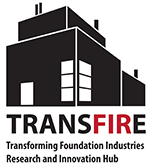Deploying AI Solutions in Foundation Industries
Virtual - ZoomTransFIRe Seminar Deploying AI Solutions in Foundation Industries: Lessons Learned from ‘Furnace AI’ Dr Peter Green, University of Liverpool Tuesday 20 December 9am - 9.45am (30 minutes talk and 15 minutes questions) Zoom (details below description) All are invited to an online TransFIRe seminar on Zoom, aligned with the Glass Technical Working Group. This presentation focuses on the outputs of a recent deployment of an AI-based monitoring system for float glass manufacturing with NSG Pilkington: Furnace AI. We discuss the challenges associated with transitioning AI solutions from academia to industry, with a focus on both technical aspects (e.g. scalability to large datasets, the removal of data that is towards the end of its lifecycle) alongside the ‘softer’ challenges that must also be addressed during deployment (e.g. risk ownership and user trust). Finally, based on the outcomes of the Furnace AI project, potential avenues of future research are suggested. [...]



